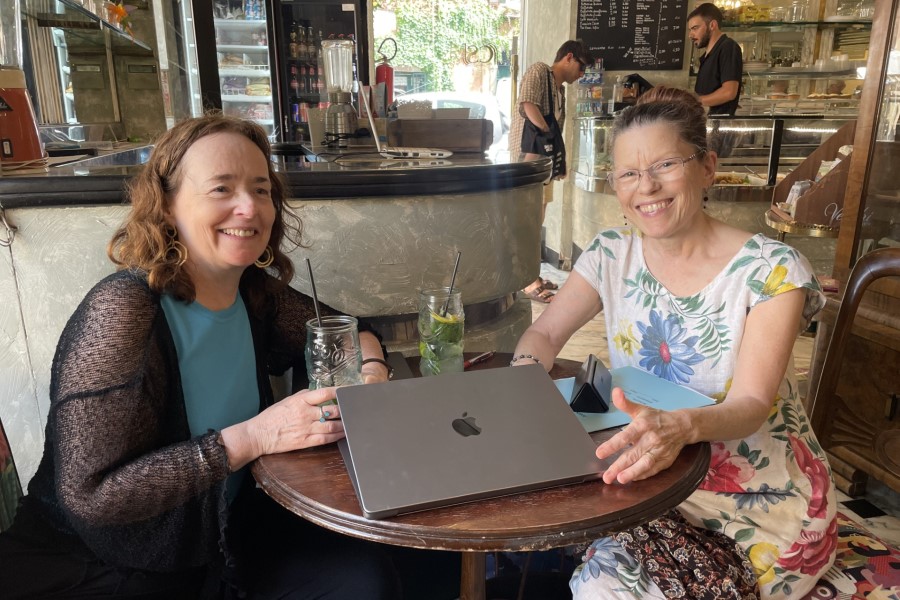Tweeting the Revolution: Causes and Prospects of the North African Upheaval
Participants Included:
Antonio Lopez
Tarek Heggy
Maria Cristina Paciello
Frederick Vreeland
Valentina Colombo (Moderator)
On Wednesday, March 16th the Aula Magna Regina filled once again to listen to a panel speak about the revolutions in North Africa and the impact of Twitter, Facebook, and other social networking sites. An introduction was given by the President of John Cabot University, Franco Pavoncello, who commented that our ability to predict the future is becoming increasingly difficult with the rapid progression and advancements of social networking. At the core of these revolutions are educated young people, which is why Facebook and Twitter are increasingly significant.

Antonio Lopez
The first speaker was Antonio Lopez, a notable media activist. Antonio Lopez followed the revolutions by paying close attention to the media, but more significantly to various tweets and Facebook pages of people in the midst of these revolutions. He focused on two general debates surrounding the revolutions in Tunisia and Egypt: the digital utopian, and the digital dystopian. The digital utopians believe that while Facebook and Twitter are excellent tools with which to build a revolution on, society now needs to focus on the use of technology to build a state, restore a functional government, and to get people back to work. Many people blame western technology for the influences that lead to these revolutions, but in the end it is an influence of these social networks that allow people to understand the function of government.
On the other hand people such as Malcolm Gladwell, author of The Tipping Point, calls internet activism “clicktivism”. He claims the ties that are created in social networking are superficial and that people have been revolting long before Twitter and Facebook. However, Lopez dismisses this as a simplistic view. Lopez acknowledges that these revolutions were not merely products of Facebook and Twitter, but were largely aided by traditional news sources, most notably Al-Jazeera. By spreading images, messages, and events, in Arabic, Al-Jazeera became the glue holding these revolutions together. However, even the director of Al-Jazeera said that the scene was a “Wikipedia of journalists.” Al-Jazeera was by no means the only news network on the field. In the end Twitter cannot topple dictators alone, but it also cannot be underestimated.
Next, the audience had the privilege of listening to the charismatic voice of Tarek Heggy, one of the most notable liberal Arab intellectuals. Tarek Heggy was born in the 50’s to the Egyptian upper middle class family. He taught at law schools in North African Universities, but resigned in 1966 to devote himself to writing. Some of his most notable works include Critique of the Arab Mind 1998 and various other essays on Egyptian Political issues. Tarek Heggy began by providing a basic history of popular thought in the Middle East. He recognized the golden age of Islam to be from the 8th century to the 12th century. In this period scholars focused on translating Greek masterpieces.
Thanks to the Arab world, the works of Aristotle were able to reach the west via Spain. There was pro-active intellectual life for 4 centuries. However, this practice was soon confronted with a debate between the idea that reality cannot reach the facts of life, reality must be reached through faith and the divine. While many in the region were beginning to adopt this point of view others insisted that the human mind was the ultimate source of power. Heggy lamented that the theological side won in the end. While this move away from rationality was happening in the Middle East, Europe was doing the opposite. Humanism was spreading, and Europe was moving forward and adopting the values of enlightenment.
“In the Arab world, we were occupied because we were backwards, not the other way around.” The imperial age left the Middle East with a loss of pride but once independence was gained, power was distributed to either medieval monarchists or to dictators who would go on to steal the wealth of the state like Gaddafi and Mubarak have done. He argued that some of the monarchies could be reformed (though he noted that Saudi Arabia was a special case and exceptionally difficult to fix).
In the 18 days that it took for Mubarak to leave power, technology was crucial to the people. It is because of technology that the people were able to discover what it means to be a citizen and have rights. The people discovered the true function of a government: To serve the people and not the other way around. The Egyptians learned that in their system they were not citizens, but objects of the state. Tunisia and Egypt both have poverty, however it was not the poor who rose up and rebelled. It was the middle class users of technology. This is the truly different thing about these revolutions.
Tarek Heggy noticed that human behavior has changed significantly in Egypt. “People were standing in lines!” he noted in what seemed like a humorous anecdote. He remarked that this usually disorderly society was showing signs of a desire to be orderly that was previously unheard of. He also noted that since the revolutions sexual harassment towards women has declined. “We had never used the word ‘former president’ in Egypt. My colleague said it, and I realized at that moment how sweet it sounded, I had to ask him to say it again… ‘former president’.” Now Egypt has set up a system in which a president can only serve 4 year terms with only one re-election. Egypt now has a chance to be something it has never been able to be before, a market economy. Without a market, there is no middle class.
Many Islamists in power argue that if they fall from power a regime much worse would ensue. Mubarak insisted, “It’s either me or Al Qaeda.” Heggy dismissed these fears as unfounded. He used a comparison to the death of Franco in Spain. After the death of Franco the fear was that the communists would take over, but instead the Spanish people received a legitimate state. The greatest challenge today is to make Egyptians believe in themselves. Millions of people would fight for a modern Egypt. The issue is that these 20-22 million people haven’t believed in themselves for many years, but in 2011 this is changing.
The next speaker was Frederick Vreeland, the former ambassador to Morocco who also served in the U.N. Security Council as the advisor on Middle Eastern affairs. He was an instrumental part in passing U.N. resolution 242 which required the establishment of a just and lasting peace in the Middle East. He laments that many of the goals (in regards to refugees, borders, and security) outlined in the resolution never happened. In fact these issues only got worse.
Autocratic leaders control the lives of everyone within their state. At times these regimes are largely condoned by the United States, who he says must take responsibility for the fact that nothing has changed. However, in Morocco, he noted that the King has been travelling throughout the country responding to the needs of the people. It was very surprising to see this young King making speeches about human rights.
Vreeland was very critical of the United States foreign policy in issues like the Algerian war, in which the United States only hoped that the two sides would weaken each other. There was a possibility of Algerian elections, but the international community did not act to facilitate such an event. He noted that technology is now in the hands of the youth as the majority of the population in the Middle East is under 30 years old. This is something that is irreversible. With the advent of Facebook and Twitter borders can no longer be sealed off.
He noted that hopefully the situation in Morocco is reforming on its own. Morocco has a young king who is married to a computer expert. Today he is continuing to circle the country opening hospitals, creating jobs, projects and schools, and has even announced a major constitutional reform. He said the public council would draw up a new constitution that would give power to the prime minister and there would be free elections.
In Tunisia, the revolution was started by a kamikaze act. Young people in our world today have the guts to die for their principles. While this is undoubtedly a good thing it does present several problems to the world. One issue is immigration. Gaddafi himself noted that if he falls Europe will experience a large immigration wave. Vreeland closed by emphasizing that what the west needs to consider now is a new Marshall Plan for the Middle East. The only way to keep immigrants from coming across will be to establish jobs in North Africa; we need to work now to help rebuild their states and to create sustainable living conditions in these countries.
The last to speak was Maria Cristina Paciello, a lecturer in Economics and Political Science at La Sapienza. She spoke emphasizing the transition period that must take place in North Africa. There are many challenges to political transition in North Africa, however the departures of Ben Ali in Tunisia and Mubarak in Egypt are crucial first steps towards political change. The Revolution has changed people’s attitudes towards life. Women have played a very relevant role in the protests. Pictures of protesters can be seen by women both with and without veils. Whereas you could once see pictures of Mubarak in every angle of the city, they have all now been torn down.
The main uneasiness of the transition remains in the coexistence of the emerging new power and the old power. The interim ruling parties in both Tunisia and Egypt are reluctant to break ties with the old powers. For example in Tunisia the former speaker of parliament under Ben Ali has assumed the role of Interim President. This paints a dangerous picture for those who truly want change in their society.
New interim governments such as those lead by Mohammed Gannouchu who was a cabinet minister under Ben Ali, and Bejo Caid Essebsi who had served as foreign minister under Abib Bourguiba, are diminishing the ability for these societies to change. Without doing away with the old system, no clear schedule of reforms, no deadlines for elections and many provincial governors, there is still reason to be skeptical of change.
However, despite reasonable skepticism, there is reason to believe that some of these interim governments are on the right path. The Interim governments have announced popular elections to nominate a national assembly. However the extent of the council’s commitment to a real political change appears still unclear and ambiguous and it is, after all, drawn up from men who supported Mubarak’s regime. There are also many who are unsure about whether the new parliaments will be as representative as hoped.
Cristina Paciello also commented on the nature of political parties, and people’s ability to have more options than they have in the past. This could present as many possibilities as it does challenges. It is difficult to gage the popularity of some regimes. Al-Nahda, the Islamist party, receives popular support but the amount of which is difficult to estimate given its long absence from the country. They are religiously conservative but they were persecuted for so long that it could have actually raised its popularity. The fate of political transitions in both countries depends on whether or not and to what extent they will be able to dismantle the previous power structure.





